We regularly hear from readers who tell us they’ve found an old copy of the Post. Usually the issues are less than sixty years old, and still relatively easy to find. Recently, though, we heard from a reader in Florida who discovered a well preserved copy of an 1824 Post in his father’s desk.
It contains the usual assortment of material from the earliest years of the Post: news items, moral essays, and poetry. But Doug Boulle, who found the paper, was particularly intrigued by the advertising.
Amid the ads for “Worsted Bombazines” and “Sarsaparilla Mead” is a message from William Cannon on Philadelphia’s South Fifth Street, who has recently—
supplied himself with a general assortment of High Box Coaches and light traveling Carriages with the front seat sufficiently large to contain a servant with the Driver, also light one- and two-horse Dearborns, together with high-finished, full-mounted six-spring Gigs, and light Sulkys—all of fancy colors, including a variety of good tempered Match Horses, with careful and attentive drivers. As it is his wish not to send his Carriages to the public stand during the approaching hot season, he is therefore determined to reduce the price of Carriage hire, &c, as low as possible.
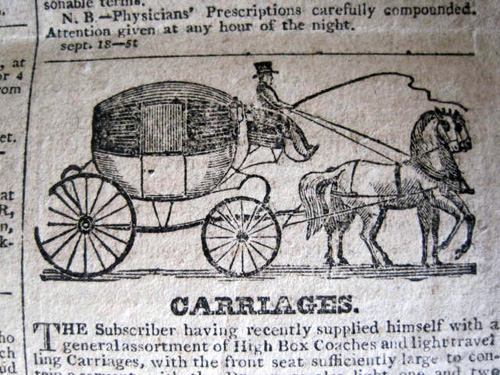
The gig and the sulky are two wheeled carts. A Dearborn is a one-horse, covered wagon, usually with side curtains. Mr. Cannon is trying to attract customers to his livery stable so his horses won’t have to stand among the swarms of flies that swarm around the other horses at the carriage stand.
Readers of the Post in early October 9th of 1824, would have been “respectfully informed” that Monsieur Adrian and his circus was engaged for six nights, starting that saturday night.
The performance to commence with a NEW GRAND CAVALCADE
HORSEMANSHIP by Master Sweet.
HORSEMANSHIP by Master Hunt, his first appearance.
STILL VAULTING — By the whole troop of Flying Phenomena, assisted by Masters Sweet and Spencer — Clown, Mr. Williams
GRAND TRAMPOLINE by Mr. Asten, who will take his Astonishing Leaps over Garters, through Balloons, and conclude with a wonderful somerset over seven horses.
HORSEMANSHIP, by Mrs. Williams. Among her numerous feats, she will go through the Manual and Platoon Exercise and discharge a musket while standing on the wire.
To conclude with the grand Romantic Melodrama of VALENTINE AND ORSON; Or, The Wild Man of the Woods.
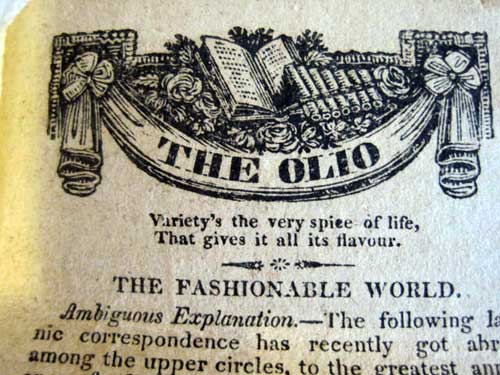
Leaping over a garter meant jumping the length of a cloth banner. Jumping through a balloon meant passing through a hoop covered with paper. A “somerset” is a “somersault” with archaic spelling. The “Manual and Platoon Exercise” is the manual of arms used by soldiers for holding, presenting, and firing a musket. “Valentine and Orson” is a play about two brothers who are separated at birth. Valentine is brought up to be a nobleman, while Orson grows up in a bear’s den to become a Wild Man. The brothers are reunited, swear eternal fidelity to each other, then set about rescuing their mother from a giant. Now that’s melodrama.
The back page includes a column of miscellany entitled “The Olio.” This little bit of gossip appears at the top of the list under the title “Ambiguous Explanation”:
The following laconic correspondence has recently got abroad among the upper circles to the greatest annoyance of a female of high fashion who is know to be the subject of it.
“Lord____ is given to understand that Sir W. ____ has affirmed in public company that Lady ____ was a person of doubtful character. Lord____ requests to be informed whether Sir W. ____ did make such assertion, and if he did, begs to ask for an explanation. The bearer will wait his answer.”
Answer: “Sir W ____ does not recollect to have used the expression referred to respecting the character of Lady____, nor does he think it likely he should, as he does not know any female in the circle of fashion of whose character there can be any less doubt.”
Translated from its genteel wording, Sir W.— questioned the honesty of Lady—. One of her relatives, or a staunch friend, demanded that Sir W— explain himself: i.e., say he was mistaken, admit he lied, or stand by his claim and await a summons to a duel. Sir W— neatly sidesteps the challenge by saying it’s unlikely he made any statement about Lady W— since he wouldn’t have any knowledge of fashionable women with doubtful characters. The insult remains and challenge is now back in the court of the Lady’s champion.
There’s an endless supply of these fascinating items at the back of these issues. While they may lack the grandeur of world news, they offer revealing glimpses of the amusements, morals, and personal life in those by-past days. For example, look at the information contained within this personal item:
A Teacher, Clerk, Superintendant, or Overseer
A person, desirous of embarking in the capacity of any of the above situations, proffers his services and is willing to go to any State in the Union, providing positive assurances be given for permanency, and ample encouragement.
As a Teacher he does not aspire above mediocrity, but will undertake to teach the first rudiments of learning, such as Orthography, Reading, Writing, Grammar and Arithmetic. Any person having a perfect knowledge of those sciences will be qualified to conduct any kind of business. As a Clerk, Superintendant or Overseer, he need only add that, in all those capacities, he has had every opportunity of becoming acquainted with the necessary qualifications to enable him to give general satisfaction. [sic]
A line addressed to B.C. and left at this office (post paid) will receive immediate attention.
The more you read it, the less B.C. seems to offer. He admits that he’s a mediocre teacher, at best. He doesn’t say he has experience as a clerk etc.; just that he’s had the opportunity to become acquainted with the qualifications for such work. But B.C. is a man of learning and ambition, however limited, and the country needs workers.
His ad appeared in just two issues before disappearing. Did B.C. run out of money to advertise, or did he find a golden opportunity in some “State in the Union”? Like many of these small items, it only provides the beginning of the story.
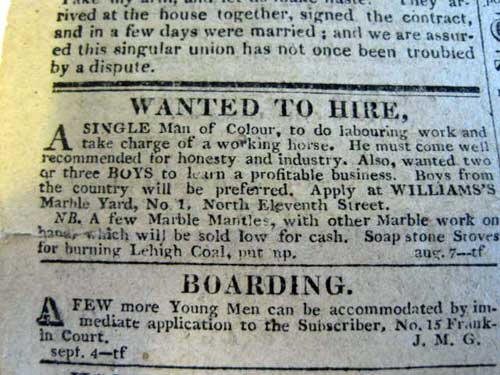
Become a Saturday Evening Post member and enjoy unlimited access. Subscribe now
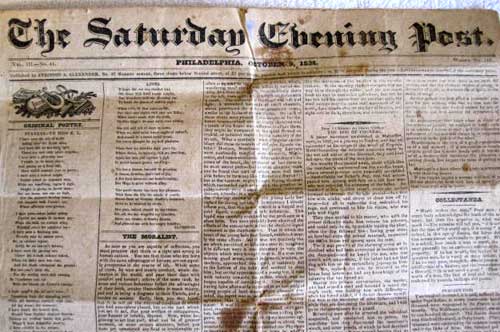
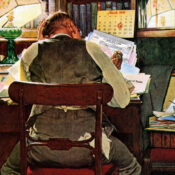
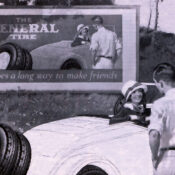
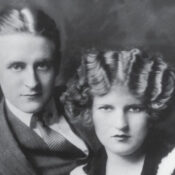
Comments
I loved reading this gem from 1824, especially the paragraphs on the teacher/clerk etc. qualifications. It’s an absolute hoot, but it is meant to indeed be taken seriously, as it would and should in 1824. I mean no disrespect in my finding some amusement in it.
This is certainly an era of the POST probably little is known about today. It’s an ancestor of the modern magazine we’ve known since about 1900 and all the time periods and changes it’s gone through, the latest which is 2009-present. It won’t be the last, and neither will the one after that. As long as the POST sticks to it’s ideals, Ben Franklin will be giving his guiding hand from above to the editors and publishers with pen in hand, glasses resting on his lower nose, and a smile on his face. He hasn’t a problem or unkind word with an online presence, but thou shalt not do away with the one that goes to press and is in physical form to thy Americans who desire it as such. Enough has been said for now on the topic.